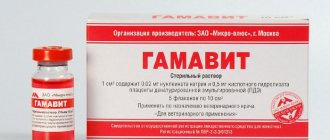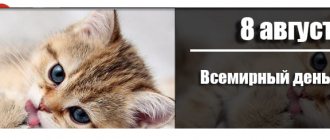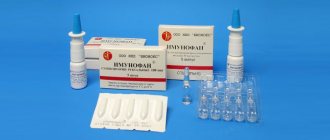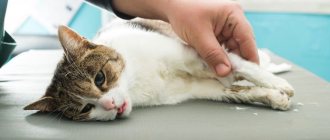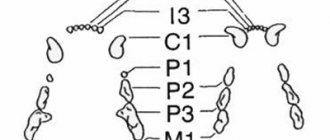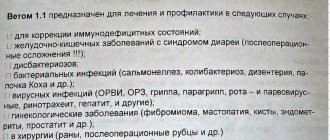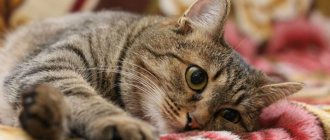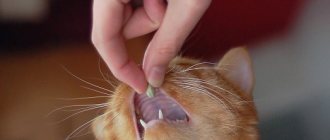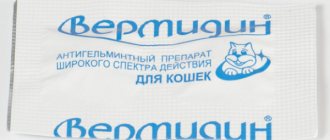Many people prefer to think about the importance of immunity only during the flu and ARVI season. But this does not mean that the rest of the time the body’s defenses are inactive. If the immune status decreases, this is fraught with permanent diseases that are difficult to treat. The same goes for our pets. Immunomodulators for cats can help in this situation.
Five-minute educational program
Almost all the media declare with pathos that “the immune system has not yet been studied.” This is wrong. Immunology appeared more than 40 years ago, and during this time scientists have made many truly outstanding discoveries. Today we know a lot about immunity, but... With each new discovery, we increasingly want to say: “I know that I don’t know.” In short, there are really a lot of unsolved secrets in this area.
Secondly, even many medical and veterinary specialists are somehow sure that the only purpose of immunity is to fight pathogenic microflora that has entered the body in one way or another. Oddly enough, this is not entirely true. Yes, protective systems actually destroy bacteria, viruses and fungi, but another area of their activity is maintaining the constancy of the body’s internal ecosystem. How can this be translated into human language?
Let's take cancer for example. A terrible disease that annually claims the lives of many thousands of people (and no one even counts animals). Do you think that the formation of a cancer cell in our body is something out of the ordinary? We will surprise you. In the body of animals and humans, tens of thousands (!) of potentially malignant cells are formed every day (!), but they are killed by the immune system. As you can understand, its significance is unrealistically great.
Contraindications for feline immunostimulants
During an exacerbation of diseases, the animal’s immune system works hard.
The immune system, which is additionally loaded with lethal doses of stimulants, may fail altogether
When immunostimulants are used thoughtlessly, the following happens: the drugs force the immune system to work even more intensely, which can lead to the opposite effect – immunosuppression.
Why is it not necessary to use immune stimulants in the acute phase of the disease?
Imagine that we give immunomodulators for animals in tablets to a cat that is suffering from an acute generalized form of some kind of infection. What happens in this case? Nothing good. In the first case, the immune system, which is already working at the limit of its capabilities, can literally lose its “settings.” The result is autoimmune pathologies. In the second case, the immune system, which is additionally “loaded” with lethal doses of stimulants, may fail altogether. At the same time, subsequent treatment will require at least twice as much time, and it’s better not to think about the amount of medications at all...
Fortunately, such catastrophic consequences are typical only for young and severely weakened animals. The fact is that the fully immune system completes the process of its formation only at the time of puberty. Under no circumstances should you use immunomodulators “just for prevention” on pregnant cats! The consequences are very negative, including the birth of kittens with autoimmune diseases.
What medications are there?
The medicine activates the animal’s body’s defenses to fight viruses.
- "Timogen". Stimulates the production of protective blood cells in the thymus gland. The drug is available in the form of a spray and is used to treat infectious diseases that are associated with immunodeficiency. More often, the immunomodulator is used after surgery or injury with wound infection. It is effective for viral hepatitis and bacterial skin lesions.
- "Neoferon". Enhances the production of antigens by leukocytes, which makes it possible to cope with infections. The drug helps the animal in the fight against viral diseases. It is better to drip it onto the mucous membranes of the animal, because this leads to maximum absorption of the product.
- "Immunol". A herbal preparation that has a stimulating effect on the immune system of cats and exhibits hepatoprotective and detoxification effects. Helps create stable post-vaccination immunity when used immediately after vaccination.
- "Immunoparasite". Used for any helminthic infestations or parasitic diseases. The product strengthens the protective mechanisms of the cat’s body and promotes rapid healing. The most common form of release is in the form of a powder, which is added to the pet’s food.
Cancer immunotherapy in cats
Well-proven immunostimulants
Gamavit. Created on the basis of placental emulsion. It contains a whole complex of biologically active substances and minerals. They help enhance the bactericidal properties of biological fluids of the body. The injections increase resistance to stressful situations, the drug is recommended to reduce postpartum mortality.
Benefits and harms from use
Immunostimulants are beneficial, but only if they are prescribed by a competent specialist.
Here are the main advantages of using these funds:
- the effectiveness of treating diseases caused by viruses, fungi, and bacteria increases;
- the body's immune system's defenses are strengthened, and the body begins to fight the disease on its own;
- speed up the animal's recovery.
Taking immunostimulants can be harmful:
- if the dosage is exceeded, you can get the opposite effect, and instead of stimulating the immune system, it is suppressed;
- if the drug was used to treat a pregnant cat, there is a risk that the offspring will develop autoimmune diseases;
- If used incorrectly, it can provoke an exacerbation of the disease or an increase in relapses.
Immunomodulators for cats: general information and basic drugs
And only when this influence is really necessary. And exactly as much as is needed to restore natural defense mechanisms.
Modern “intelligent” immunomodulators in veterinary medicine are mandatory:
- included in schemes for the prevention and treatment of viral and bacterial infectious diseases (canine distemper, viral enteritis, salmonellosis, etc.), parasitic diseases (helminthiases, demodicosis, etc.), fungal infections (dermatophytoses, etc.);
- used in veterinary psychoneurology (stressful conditions in cats and dogs after moving, exhibitions, etc.) and geriatrics (treatment of diseases and immunodeficiency conditions associated with the age of animals);
- used in the process of preoperative preparation and postoperative treatment, prescribed in the postpartum period, for vitamin deficiencies and exhaustion.
And this is not a complete list.
The use of immunomodulators in veterinary medicine has not only radically changed established approaches to treating animals, but has also made it possible to significantly reduce the list of diseases traditionally considered incurable or difficult to treat.
The use of immunomodulators for dogs is indicated for the following diseases:
- plague, viral enteritis, piroplasmosis (a severe infectious disease that occurs after a tick vector bite) and other infections;
The use of immunomodulators for cats is indicated for the following diseases:
- hermatonellosis (infectious anemia), dermatomycosis (ringworm), false rabies and other diseases.
Timely use of immunomodulators gives pets and their owners a chance for a favorable outcome, sometimes even in the most advanced cases.
A separate area of application of immunotherapy is veterinary oncology. Given the seriousness of the diagnosis, the prescription of potent immunostimulants, such as roncoleukin and its analogues, is still practiced here. However, competent veterinary oncologists prefer modern immunomodulatory agents, which are fundamentally different from immunostimulants in their mechanism of action and the absence of side effects and complications.
It is to this group of immunomodulators that Biobran belongs, which in its effectiveness is similar to immunostimulants for emergency use, and at the same time has a high safety profile.
Please note: This article is intended for veterinarians only and should not be used by cat owners to self-treat their pets.
Types of immunomodulators
The following immunostimulants are most often used to treat cats:
- Gamavit. The solution is bright red-pink in color and is available in sterile glass bottles. The drug restores metabolism, stimulates the immune system, helps the body cope with stress and strain. The composition includes amino acids, vitamins, saline solution. The medicine is injected into a muscle, into a vein, or orally.
- Fosprenil. A transparent solution that is available in sterile glass vials or bottles. The main component is disodium salt of polyprenols phosphate. The drug has a stimulating effect on the immune system and accelerates recovery from viral infections. The drug is administered either orally, intravenously, subcutaneously, or intramuscularly.
- Anandin. The drug is available in three forms, the main component in all of them is glucoaminopropylacridone in different concentrations. Drops for the nose and eyes are a clear liquid that relieves inflammation, destroys germs, and speeds up recovery from rhinitis and conjunctivitis. The ear drops are light yellow in color. The medicine destroys streptococci, pneumococci, staphylococci, and is effective for otitis media. The solution for intramuscular injection has a bright green color. The product accelerates the recovery of cats suffering from viral infections (panleukopenia, hepatitis, etc.).
- Gamaprene is intended for drinking. The main component is a solution of disodium salt of polyprenols phosphate. Effective for viral feline infections (calcivirosis, herpes, rhinotracheitis, rhinitis, stomatitis, conjunctivitis, etc.). The medicine has a stimulating effect on the cat’s immunity and skin.
Immunomodulators are drugs that cannot be prescribed independently.
Without knowing the exact diagnosis, taking such medications can harm your pet.
But if there is a need to resort to the use of immunomodulators, be sure to consult a veterinarian.
The first immunostimulants appeared on the list of veterinary drugs in the middle of the last century. They acted actively and aggressively, which is absolutely unacceptable when regulating the immune system - a delicate and complex system.
The use of drugs such as levamisole often led to the exact opposite effect in the treatment of cats, dogs and other domestic animals: a complete imbalance of defense mechanisms, metabolic disorders, hormonal dysfunction and other serious problems.
Therefore, scientists were forced to look for new compositions and new formulas. As a result of these searches, drugs with a milder and safer effect - immunomodulators - came into veterinary practice.
When developing immunomodulators for veterinary medicine, specialists took into account all the disadvantages of immunostimulants. New generation drugs have “learned” to influence individual parts of the immune system as selectively as possible.
How to strengthen a cat's immunity
To strengthen, activate, and restore protective forces, immunomodulators (immunocorrectors) are used in veterinary practice. Created on the basis of natural, microbiological, biological, synthetic components.
Immunomodulators for cats:
- Gamavit, Gamavitforte . Vitamin immunostimulating complex preparation with a pronounced antiviral effect. Contains minerals, amino acids. Prescribed for prevention and therapeutic therapy for various pathologies and viral infections. Improves natural resistance, accelerates the recovery period, eliminates the effects of stress and intoxication.
- Aminosol . A veterinary drug that stimulates the immune system based on hydrophilic vitamins, amino acids, liquid salts for cats of different breeds and age groups. Prescribed for stress, loss of appetite, septic conditions, oncology, to restore the body after operations, illnesses, as well as during periods of intensive growth and development.
- Immunophore . Increases resistance to infections, stress, resistance, normalizes immunity.
- Imuno-Vet for cats . The composition of the drug includes extracts of medicinal herbs and plants. Used in cases of weakened immunity, to normalize metabolism, in the treatment of fungal and viral infections, and in the postoperative period. The veterinary drug has an anti-inflammatory and antibacterial effect. It has a beneficial effect on the nervous, respiratory and reproductive systems of the body. Increases resistance to pathogenic agents.
- Vetom 1.1 . A complex drug for the treatment of various diseases, stimulation of defenses. Accelerates growth, normalizes metabolic processes, removes toxins from the body. Used for various immunodeficiency conditions in animals.
- Pharmax . Vitamin and mineral preparation. Improves immunity, increases the body's resistance to infections, accelerates the process of recovery and rehabilitation. Helps cope with stress, normalizes metabolism.
- Roncoleukin . Prescribed in the treatment of purulent-inflammatory and oncological diseases. Prescribed to restore immunity.
- Glycopene . Eliminates post-vaccination complications, increases the effectiveness of vaccines, stimulates regeneration, increases cellular immunity, and reduces the risk of developing oncological processes.
- Evinton . Complex veterinary drug for stimulation and enhancement of nonspecific immunity. Prescribed in the treatment of viral diseases of unknown etiology.
